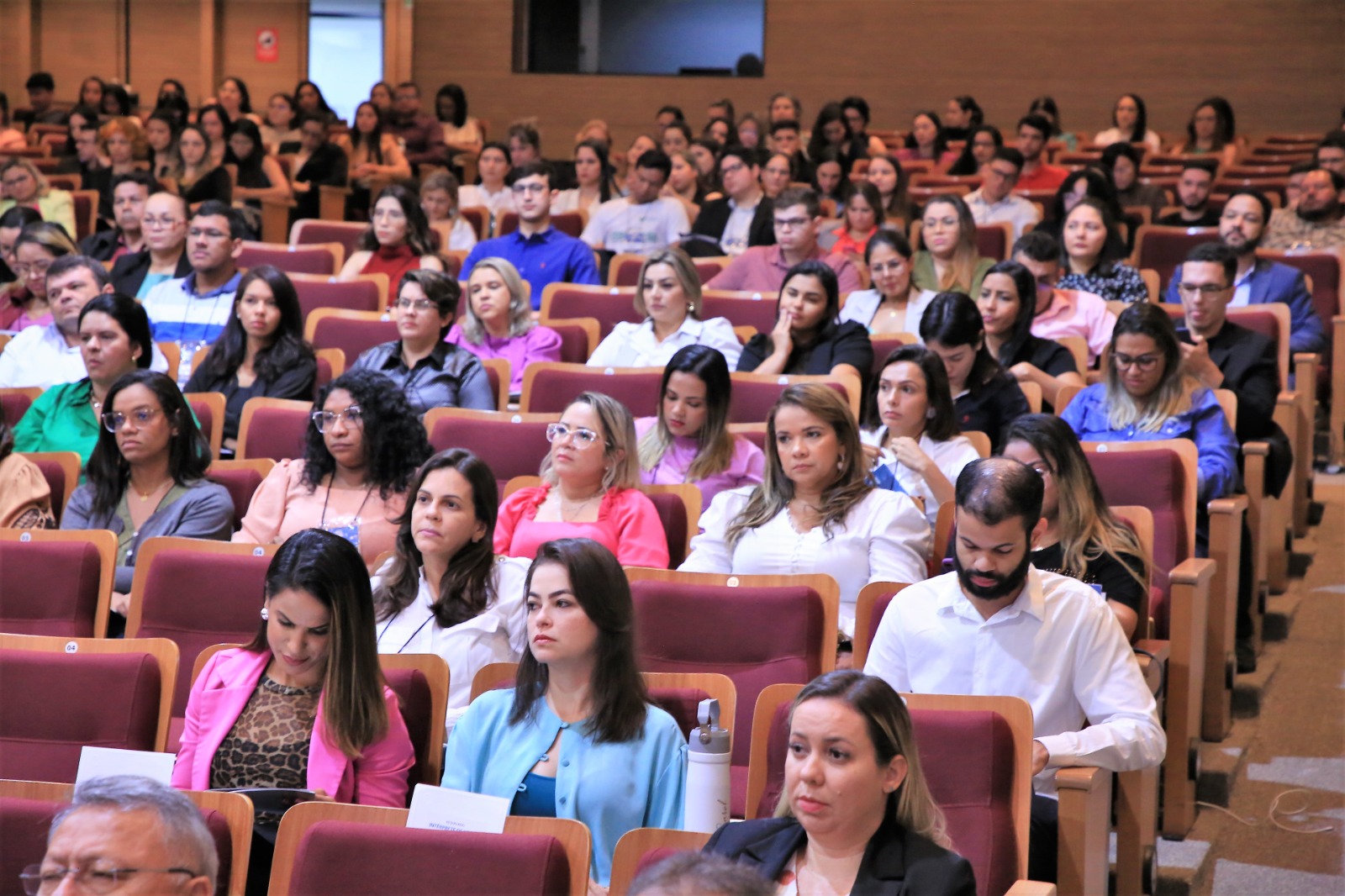
The challenges of the National Forum of Mediation and Conciliation (FONAMEC) post-pandemic and the obstacles in the implementation of restorative justice in the judiciary were the focus of debate and reflection this Friday morning (17th) during the VI Seminar on Public Policies for the Adequate Treatment of Conflicts.
The second lecture of the morning, given by Judge Gildo Alves de Carvalho Filho, president of Fonamec, and coordinated by Judge Silvana Maria Parfieniuk (TJTO), approached issues related to the difficulties of the institution after the corona virus pandemic. In the opportunity, the Judge delivered a symbolic gift, a small wooden canoe, symbol of Fonamec, to the Justice Etelvina Maria Sampaio Felipe, president of the Court of Justice of the State of Tocantins. In his speech, Gildo stressed the importance of building partnerships and ties in favor of mediating conflicts.
"I like some symbologies; when we started our management at Fonamec, we elected a symbol. I come from the Amazon, and because of the water we have almost no roads, we communicate by rivers and we chose a canoe as a symbol of our journey. As a way of spreading this, in every court I go to, I give one to the Presidency, as a way of inviting everyone to get in the same boat and row in the same direction", he explained.
In thanking him, the president of TJTO affirmed, with metaphoric phrases, her commitment to work and partnership in the promotion of actions that aim to contribute to the improvement in the treatment of conflicts.
"You can be sure that we are in the same boat, sailing in this same boat to transform our culture of conflict into a culture of peace. As I said before, we in the Judiciary do not work for ourselves, but for the betterment of our society."
During his lecture, the Judge presented to the registrants a contextualization of the main challenges faced by Fonamec during and after the pandemic period. In his expositions, he mentioned some problems related to communication.
"The reality in Amazonas is very different from here (...). We had some communication difficulties because of the lack of roads. Imagine how it is to communicate with people who live in places where there is no signal or telephone", he said.
For the Judge, mediators and conciliators need to talk about what they want to achieve, about their role, and especially about their intentions during conflict processes.
"We need to do this internal reflection, before questioning the users of the system, who are the people who really suffer", he commented.
Also during his presentation, Gildo stressed the importance of the work done by mediators and conciliators who are active and qualified.
"We cannot make public policies of self-composition without qualified mediators, we are talking about a public policy that requires dedicated knowledge, we are talking about science, we are not talking about doing it anyhow. We have to create a joint policy with all the centers (...). We need points of reflection that aim to improve the lives of these people", he concluded.
In the occasion, Judge Silvana Maria Parfieniuk (TJTO) thanked for the lecture of the Judge and highlighted his commitment and availability for the development of restorative practices. "I have already boarded this canoe of conciliation, we all have to fit in it, let's all get on board together and continue this work", she said.
Third Lecture: Main Challenges of Implementing Restorative Justice
The third lecture of the morning was attended and presented by Judge Richardson Xavier Brant, from the Court of Justice of the State of Minas Gerais (TJMG), coordinated by Judge Rosa Maria Gazire (TJTO).
With a more academic presentation, Judge Richardson brought to the registrants a varied and complete bibliography on the theme involving the challenges of implementing restorative justice. Besides, of course, reflections on the changes of old paradigms.
"The first logical counterpoint is related to the issue of paradigms - a new paradigm is when it starts to implant itself; through reformism, certain values that the previous paradigm brought, they lose place, they start presenting answers that are no longer consistent enough for those problems we face. This change of mentality and posture, of culture, demands from us a little more, besides reflection, it demands from us, as it is a practical knowledge, a change in knowing how to deal with people, in the way we place ourselves in relationships, especially in the main thing: how we do things. This process demands a lot of dialogue, demands the rupture of verticalizations, demands horizontality. The restorative justice proposal has a democratic content, and people need to be seen beyond positions and social status, to their dignity, seen as equals. This is a first challenge", he explained.
According to the Judge, another extremely important challenge is linked to racial and ethnic issues in Brazilian society.
"We cannot fail to remember that our society is extremely stratified. And it is from two aspects of this society that we need to reflect; the first is slavery, slavery and the structural racism that still permeates our institutions and relationships, the other is the indigenous genocide. Almost 3 million people have already been exterminated, today we have a little more than 900 thousand. This is a reason for reflection (...). We have to retrace our steps in our history to review what we need to change", he contextualized.
The VI Seminar on Public Policies for the Adequate Treatment of Conflicts and the VII Meeting of the Judicial Centers for Conflict Resolution (CEJUSCs) is an event organized by the Superior School of the Judges of the State of Tocantins (ESMAT) in partnership with the Permanent Center for Consensual Methods of Conflict Resolution (NUPEMEC).




